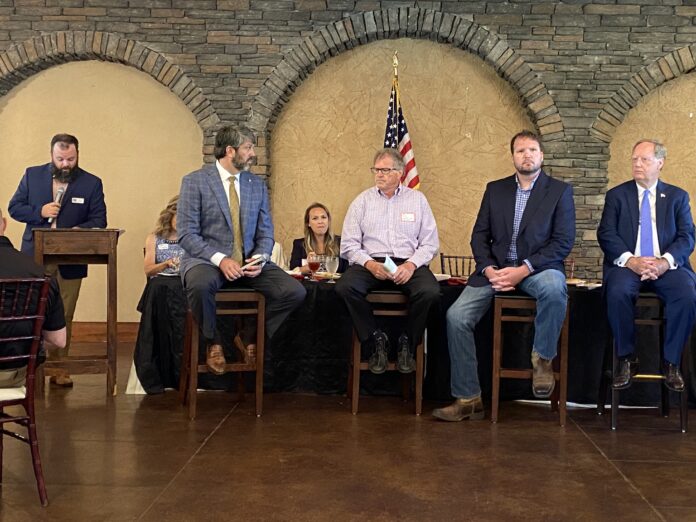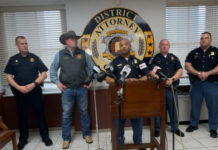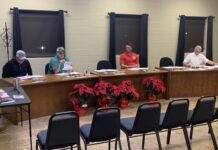
CULLMAN, Ala. – The Cullman Area Chamber of Commerce hosted a Community Luncheon on June 17 at Stonebridge Farms to bring an update on important issues to the community with the State Delegation of Senator Garlan Gudger, Representative Randall Shedd, Representative Corey Harbison and Representative Tim Wadsworth.
The event was presented by State Farm Insurance Agent Shirley Quattlebaum who presented their Neighborhood Assist grant check of $25,000 to the Link of Cullman County. For their 100th anniversary on June 7, State Farm awarded 100 grants. Executive Director Melissa Betts got the application in for the grant in the first 55 minutes after it became available. Only, 4,000 applications were accepted, and out of those, only 200 were selected for the vote. The community of Cullman County outvoted several other more populated areas from all over the country to make sure their valued neighbor, the Link, was recognized and granted the funds they need.
Keith Varden asked the forum of the State Delegation questions about possible community concerns. Starting on the topic of school security, Varden asked about the steps that Alabama is taking to find safety solutions. Tim Wadsworth stated that most of the counties in District 14 had SRS officers, saying, “As far as getting an SRS officer, I think it’s got to be a combination of legislature, County, Board of Education and cities working together to fund the SRS officers.”
Gudger stated, “I think we all agree that there’s nothing more important than the safety of our children.” He shared that a resident of Jones Chapel is developing a bulletproof mesh system that would pull from the wall of a classroom and could be locked down so a shooter could not penetrate. He said that the system has gotten national attention. “I’m glad that Cullman, Alabama might have a chance to do something on a national scale.”
When asked about a coming recession, Wadsworth answered, “Obviously we have a recession. The bottom line is, people’s income is dropping.” However, he shared that there have been several tax changes made that will benefit individuals and businesses in Alabama.
Gudger added, “As far as inflation at a state level, if I can raise that up to the state level, you have the best budget we have ever had. (The) Education Trust Fund budget is higher than it’s ever been. The General Fund budget is higher than It’s ever been. We’ve paid off more debt this year than we have in the last three years. The state of Alabama is in good financial health and we’re ready for the recession even though no one wants that to happen at the state level. We’re all putting back a little bit.”
When asked about the political climate from the last session in Montgomery, Gudger said, “It’s very intense, everybody would like to win their seat back. If you’re running for office, usually you think you’re the best candidate for that job or you wouldn’t have signed up for it. There needs to be direct debates going back and forth in every race; it doesn’t matter if it’s a local race all the way to U.S. Senate.”
The delegation also discussed the major issues they were currently seeing in Alabama. Wadsworth said that in his district, including Sumiton and Walker Counties, the rural areas many times do not have basic infrastructure. “You’ve got to be able—the larger cities—to work with the smaller cities, and y’all seem to do that here in Cullman, but in some areas it doesn’t exist.” Therefore, he said, legislatures need to canvas smaller towns for their needs. “I grew up in a small town, and as a result of being a small town, you’ve got to get your basic medical care. You’ve got to get ambulance services in your area. You’ve got to have your parks, your schools, there’s a lot of things in just helping your small community.”
Harbison spoke overcoming misinformation, “I think one of the biggest challenges we have in the legislature, and it’s a good thing and it’s a bad thing—but social media. I’ve been online and I see good information, but I also get online and see a bunch of bad information. It always seems the bad information has a lot more shares than the good information, so now we’re stuck putting out fires from misinformation. It’s a good way to mass communicate and get the word out, but if you’re on social media make sure what you’re sharing is true.”
In response to the question of what items they were able to see pass in the last legislation that they were most proud of, Shedd spoke about the Adoption Promotion Act which would give adoptive parents the same benefits as biological parents. The Adoption Promotion Act of2003 is a U.S. federal statute that was signed into law by President George Bush. The act reauthorized the adoption incentive payments program under part E of title IV of the Social Security Act.
Wadsworth and Harbison both found the Constitution Carry bill to be one of the most important. Gudger’s favorite bill he had seen passed was a tax package for small businesses and large industries. “He said if you have tables and cash registers and you already paid sales tax on it when you purchased it, the state will come in later and say, ‘you have to pay on tax on that every year from here on out.’ I personally totally disagree with that, so we eliminated that.”
Gudger also brought up the transgender bathroom bill, with a new addition that limits classroom instruction on gender identity and sexual orientation in grades K-5. The transgender bathroom bill is for grades K-12. He said, “If you are a boy, you have to go to the boys’ restroom. If you are a girl, you go to the girls’ restroom. The reason that came up, which might be different than what you think, is for the fact that I had a transgender student, and their parents came to me and said that they felt uncomfortable in the different bathroom and wanted it to go back to what it was.”
The delegation concluded with a question about Choice Schools. There are a variety of school choice options available for many of the 1.1 million children living in Alabama. Families in Alabama can choose from traditional public schools, public charter schools, public magnet schools, private schools, online academies and homeschooling. Gudger supported the bill in areas where kids or parents may not feel safe at a particular school but wasn’t sure how the bill would affect Cullman County. Shedd concluded, “We’ve got to be careful and find the right balance. Our public schools are so important to everything—our children and our economy. Some things sound good, just got be careful.”
Copyright 2022 Humble Roots, LLC. All Rights Reserved.




























